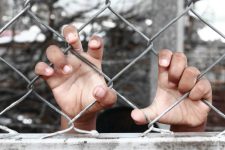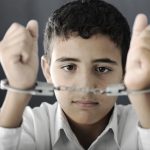It’s Time to Raise the Age of Criminal Responsibility

Right now, children as young as 10 can and are being arrested and locked up in youth detention centres across the country. And this puts Australia out of step with the majority of other nations around the globe where the age of criminal responsibility is higher.
This policy of locking up kids of primary school age disproportionately impacts First Nations children. Indeed, Aboriginal and Torres Strait Islander young people are 25 times more likely to be imprisoned than non-Indigenous youth.
In June this year, it came to light that 100 percent of children in detention centres in the Northern Territory were Indigenous, whilst in NSW, 48 percent of kids in juvenile detention were Aboriginal and Torres Strait Islander.
At a meeting of the Council of Attorneys General (CAG) on 23 November, Australian attorney general Christian Porter and his state and territory counterparts agreed to establish a 12 month investigation into whether the age of criminal responsibility should be raised from 10 to 16 years old.
According to Amnesty International, this is the first time all Australian jurisdictions have considered raising the age. The human rights organisation has long campaigned for an increase, asserting that adolescents haven’t yet developed to a stage where they can form criminal intent.
Calls for immediate change
“We’re pleased that attorneys general responded to the massive momentum behind this issue from health experts, human rights experts and lawyers,” said Belinda Lowe, Indigenous rights campaigner at Amnesty International Australia. “However, waiting 12 months for yet another report is simply too long.”
The Royal Commission into the Protection and Detention of Children in the Northern Territory published its final report one year ago. It recommended that the age of criminal responsibility be raised to 12 years old in the NT and that no children under 14 should be incarcerated.
Following the tabling of the report, organisations – such as the Royal Australasian College of Physicians, the National Aboriginal and Torres Strait Islander Legal Services and the Human Rights Law Centre – joined to call on all Australian jurisdictions to raise the age of criminal liability to 14.
“The evidence is clear. And the attorneys general must immediately legislate to raise the age,” Ms Lowe told Sydney Criminal Lawyers®. “The almost 600 young kids locked up under 14 cannot wait any longer.”
The revolving door of the justice system
According to Ms Lowe, children that are locked up before the age of 14 are three times more likely to become chronic adult offenders than those who aren’t. And she added that children have been “kept in horrendous and potentially damaging conditions”.
The Royal Commission into child detention was sparked by the barbaric practices being carried out at Don Dale youth detention centre, where children were found to be kept in isolation cells for close to 24 hours a day, tear-gassed, and strapped to mechanical restraint chairs.
As Amnesty’s The Sky Is the Limit report points out, the prison environment stymies the development of young children. And rather than solving any issues kids may have, it exacerbates them and creates new mental health and social problems.
“We are trapping these kids in the quicksand of the justice system,” Ms Lowe added, “and the system is broken.”
From the inside out
Aboriginal justice campaigner Keenan Mundine knows all too well what it’s like getting caught in the justice system. After losing his parents at an early age, Mr Mundine ended up being sent to a detention centre at 14. And from there he got into a cycle of being released and reoffending.
Today, Keenan runs the Inside Out Aboriginal Justice Consultancy. It’s an Aboriginal owned and led firm. One of the projects it runs is Street Smart, which is an early intervention, prevention and diversion program for youth at risk of becoming involved in the criminal justice system.
Mr Mundine welcomes the CAG investigation. “It’s a great development,” he said over the phone, adding that raising the age of criminal responsibility can lead to a way out for the young people with “intergenerational involvement” in the justice system.
“There were many children like myself in custody and our family and community circumstances were never addressed,” Mr Mundine recalled. “They just worried about our behaviour and misconduct and locked us up. It didn’t really deter us from doing anything.”
Alternatives to detention
“Evidence has shown that we need to keep kids out of the justice system entirely and instead connect them with the services that address their underlying issues,” Ms Lowe continued. She stressed that alternative sentencing options – such as early intervention programs – are key.
And the Indigenous rights campaigner pointed to the recommendations set out in The Sky Is the Limit report, which include funding for psychologists to work with children who are displaying risk factors that might lead to future offending.
The report also recommends funding for First Nations-led and controlled organisations that can design and run culturally appropriate preventative programs that can address the needs of young children who are coming into contact with the criminal justice system.
“It’s important that kids learn from their mistakes,” Ms Lowe set out, “but locking them up is not the way to achieve that.”
Providing a path out
Following Mr Porter’s announcement of the 12 month review early this week, the conservative press ran headlines claiming that raising the age of criminal responsibility would somehow give “juvenile delinquents” the green light to commit crime.
However, Mr Mundine believes this is the wrong way to look at it. “We know detention is not a deterrent,” he explained. “We know it doesn’t deter young people from committing offences.” And at present, the number of young people getting involved in crime is on the rise.
“It will help us break the cycle and be able to support people that are really entrenched in the system.” Mr Mundine concluded. “It will divert them from the justice system and work with them where they are at.”







